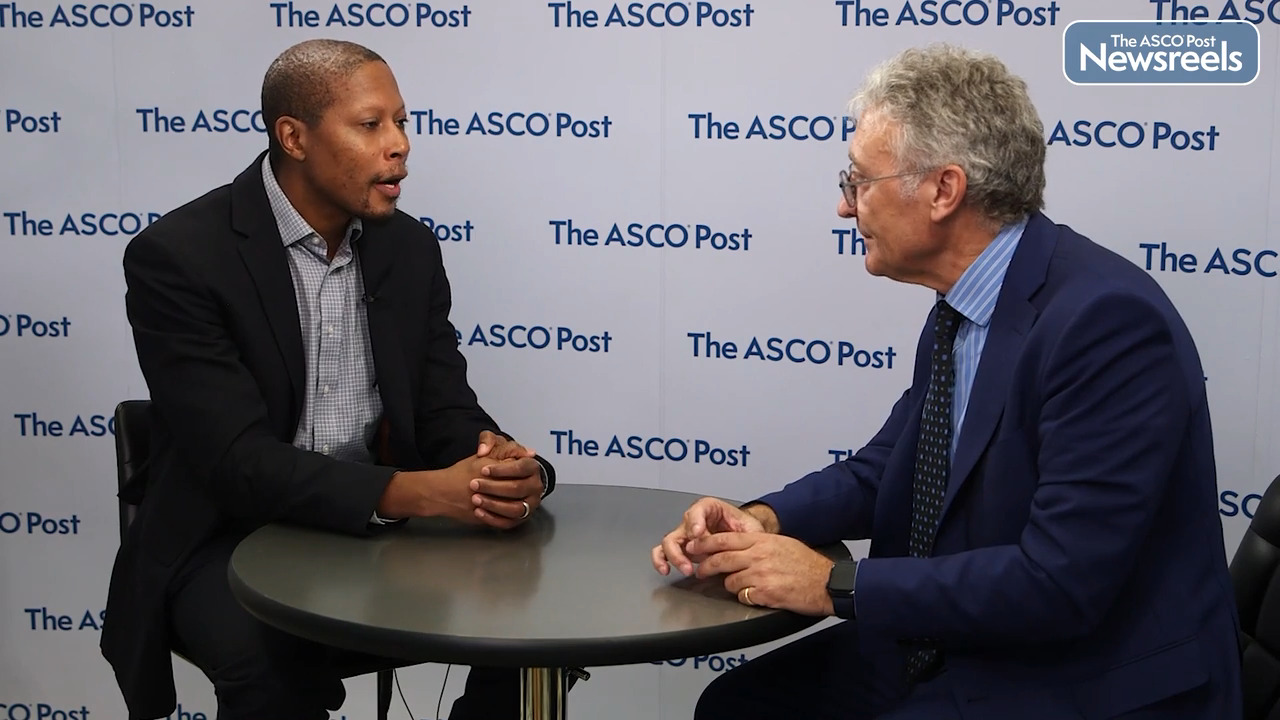Narjust Florez, MD, and Ferdinandos Skoulidis, MD, PhD, on NSCLC: Findings on Sotorasib vs Docetaxel in the CodeBreaK 200 Trial
2023 ASCO Annual Meeting
Narjust Florez, MD, of Dana-Farber Cancer Institute, and Ferdinandos Skoulidis, MD, PhD, of The University of Texas MD Anderson Cancer Center, discuss results of a biomarker subgroup analysis, showing that sotorasib demonstrated consistent clinical benefit vs docetaxel in all molecularly defined subgroups of patients with pretreated KRAS G12C–mutated advanced non–small cell lung cancer (NSCLC). Although no predictive biomarkers were confirmed, novel hypothesis-generating signals were observed (Abstract 9008).
The ASCO Post Staff
Tycel J. Phillips, MD, of City of Hope National Medical Center, and Emanuele Zucca, MD, of the Oncology Institute of Southern Switzerland and the International Extranodal Lymphoma Study Group, discuss findings from the largest prospective study of patients with primary mediastinal B-cell lymphoma. The trial data support omitting radiotherapy in patients who achieve complete metabolic response after immunochemotherapy (Abstract LBA7505).
The ASCO Post Staff
Bobbie J. Rimel, MD, of Cedars-Sinai Medical Center, and Isabelle L. Ray-Coquard, MD, PhD, of Centre Léon Bérard and the University Claude Bernard Lyon Est, discuss findings from the COLIBRI trial, which showed that, for patients with cervical squamous cell carcinoma, neoadjuvant nivolumab plus ipilimumab is safe and orchestrates de novo immune responses. The 82.5% complete response rate for primary tumors 6 months after standard chemoradiation therapy suggests favorable clinical outcomes (Abstract 5501).
The ASCO Post Staff
Thomas E. Hutson, DO, PharmD, of Texas Oncology, discusses the 4-year follow-up results from the CLEAR study for patients with advanced renal cell carcinoma (RCC). The data showed that lenvatinib plus pembrolizumab continues to demonstrate clinically meaningful benefit vs sunitinib in overall and progression-free survival, as well as in overall and complete response rates, in first-line treatment (Abstract 4502).
The ASCO Post Staff
Jonathan W. Riess, MD, of the University of California, Davis Comprehensive Cancer Center, explores the findings of three important clinical trials in lung cancer treatment: whether to incorporate immune checkpoint inhibitors into the treatment of EGFR-mutated lung cancer, the importance of central nervous system activity in EGFR-mutant lung cancer, and new therapies for disease with EGFR exon 20 insertion.
The ASCO Post Staff
Catherine C. Coombs, MD, of the University of California, Irvine, discusses prolonged pirtobrutinib therapy, which continues to demonstrate a safety profile amenable to long-term administration at the recommended dose without evidence of new or worsening toxicity signals. The safety and tolerability observed in patients on therapy for 12 months or more were similar to previously published safety analyses of all patients enrolled, regardless of follow-up (Abstract 7513).





